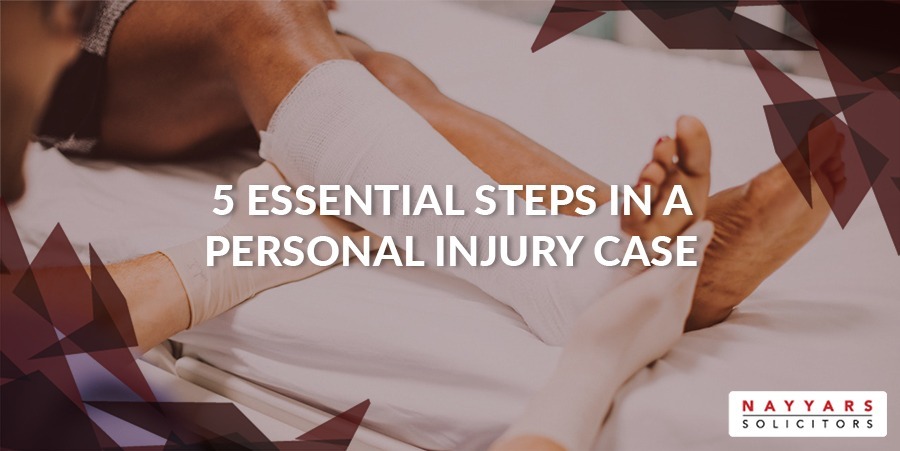LAW SOCIETY EXCELLENCE AWARDS 2019 WINNER!
5 Essential Steps in a Personal Injury Case

5 Essential Steps in a Personal Injury Case
Personal injuries are never welcome, but a successful claim for damages can go a long way to making one more bearable. Still, as with any legal situation, claiming for an injury that isn’t your fault can be a drawn-out and stressful experience.
That’s why it’s important to understand exactly what steps you need to take as soon as you suffer an injury and suspect you may have a claim. If you don’t, you may find your claim weakens as you get further and further from the event.
So, what steps in a personal injury claim should you take?
1. Speak to a Solicitor Early

Following an injury, it’s natural to feel a host of emotions. Anger may tempt you to immediately pursue the party you think is at fault, while worry may make you want to just wait and see the outcome of your injury.
Most people feel both these emotions, while many will also feel there is nothing they can do.
Whatever you feel, though, the best first thing you can do is seek an impartial expert who can give you clear-headed guidance. Speaking to a solicitor early can give you this and help you understand whether you have a claim and the scope of it.
While you may be hesitant about the potential costs of using a solicitor, an initial consultation will usually be free. Plus many personal injury solicitors offer a no win no fee package, so if you do want to take your claim forward you have added protection.
Here are some of the things a solicitor can help you identify:
- Whether another party involved was negligent
- If and who the defendant is to seek compensation from
- A rough timeline for your claim
- A rough prediction of what your claim may be worth
- Information about relevant case law
With every personal injury claim having its own quirks, considering the above points with a professional is key to your launching your claim on the right foot and preparing it for success.
2. Pre-Action Protocols
Once you’ve determined whether you have a claim, you or your solicitor’s next step is to start the pre-action protocols.
Since the courts want to reduce the number of cases that come before them, pre-action protocols offer a much-needed opportunity to present your claim to the party(s) you think is liable.
This begins by you sending a document called a Claim Notification Form to the other side’s insurance company. This is done electronically. The Defendant’s Insurance company then has a set time period within in which to reply and either accept fault or deny it. If they reject it, they have to give their own legal basis for doing so.
Here is where having the support of a solicitor becomes so important, as understanding and responding to the legal argument of your opponent can be difficult.
3. Evidence Gathering

If the party you’re claiming against denies liability, you’ll need to begin preparing for the chance that you may need to start court proceedings. To do this you’ll need to submit court papers outlining your case and relevant evidence.
Before you do this, though, you’ll need to ensure you have the evidence to back up your claim. This may involve speaking to witnesses and taking their statements or consulting experts who can comment on any equipment or procedures that led to your accident.
As you can imagine, every personal injury claim is unique and requires its own specific evidence, so it’s impossible to say exactly what evidence you’ll need to gather without knowing the details of your case.
Medical Evidence
Alongside gathering evidence of liability, you’ll also need to provide evidence of the extent of your injuries.
If your injury has left you with visible marks, such as bruising, it is important to capture this evidence as soon as possible, in case it fades over time. Try and collate as much information as you can in relation to your injury.
Since personal injury claims can take so long to conclude, you should also keep notes on anything your injury stopped you from doing, or any times you needed help, such as with housework. This will save you having to remember everything later.
In due course, your solicitor will arrange for you to see an independent expert who will prepare a report into your injuries. This will form the basis of your claim in terms of valuing your injury. It is therefore very important when you see the expert you inform them of all symptoms.
4. Negotiating
While the satisfaction of taking the liable party to court may be appealing, the far more cost-effective solution is to open a dialogue with the party and negotiate a settlement.
This is normally done in cases where liability has been admitted via the electronic portal. If there is a dispute over who was at fault to the extent of your injuries, the next step may be to issue court proceedings.
Your solicitor should advise you on any settlement offers you receive so you can make a choice whether or not to accept.
5. Court Proceedings

If negotiations fail, your final recourse is to send proceedings to the court and the defendant.
Depending on the size of your claim, you may find that your case can be fast-tracked through the court. To qualify, your claim needs to be under £25,000 and the trial needs to likely not last more than a day.
If you do qualify for the fast-track, the court will aim to move from allocating your case to conducting the trial in no more than 30 weeks. For those unused to court proceedings, this may seem like a long time, but it’s really not.
For cases of more than £25,000 and where there are multiple witnesses may result in the trial lasting more than a day, the case will be tried through the multi-track.
In these instances, the court will set a general timetable depending on the specifics of your case. Your solicitor should be able to tell you more.
How Long Do You Have to Make a Claim?
As you can probably now guess, making a personal injury claim is a process that can take an extended period of time. For that reason, you need to ensure you have explored your claim as soon as possible. Court rules dictate that you normally only have three years from the point of the accident to do so.
If you’re considering a personal injury claim, get in touch with the team at Nayyars to learn how we can help you.


